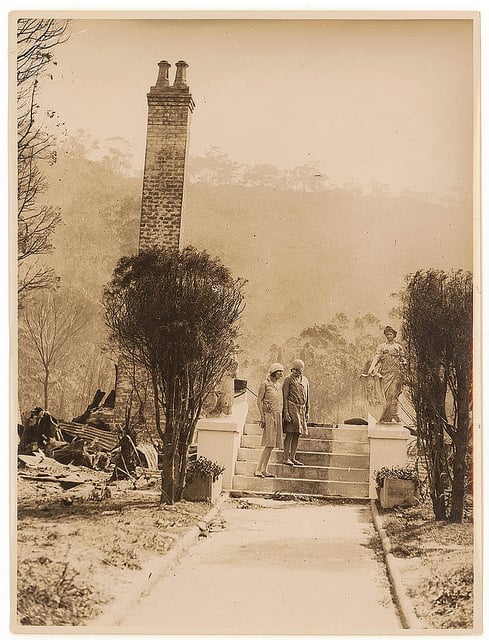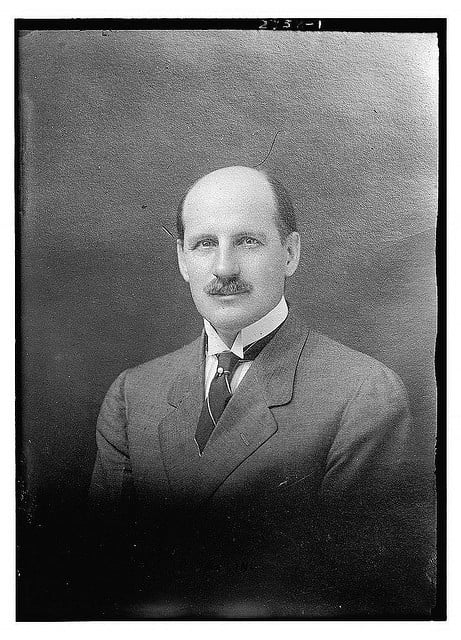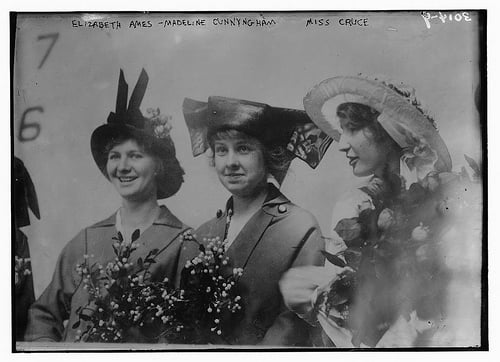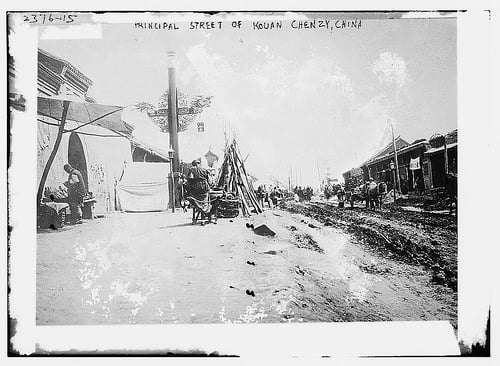Goslings (1)
By:
September 7, 2012

HILOBROW is pleased to present the first installment of our serialization of J.D. Beresford’s Goslings (also known as A World of Women). New installments will appear each Friday for 23 weeks.
When a plague kills off most of England’s male population, the proper bourgeois Mr. Gosling abandons his family for a life of lechery. His daughters — who have never been permitted to learn self-reliance — in turn escape London for the countryside, where they find meaningful roles in a female-dominated agricultural commune. That is, until the Goslings’ idyll is threatened by their elders’ prejudices about free love!
J.D. Beresford’s friend the poet and novelist Walter de la Mare consulted on Goslings, which was first published in 1913. In May 2013, HiLoBooks will publish a beautiful new edition of the book. “A fantastic commentary upon life,” wrote W.L. George in The Bookman (1914). “Mr. Beresford possesses the rare gift of divination,” wrote The Living Age (1916). “It is piece of the most vivid imaginative realism, as well as a challenge to our vaunted civilization.” “At once a postapocalyptic adventure, a comedy of manners, and a tract on sexual and social equality, Goslings is by turns funny, horrifying, and politically stirring,” says Benjamin Kunkel in a blurb for HiLoBooks. “Most remarkable of all may be that it has not yet been recognized as a classic.”
SUBSCRIBE to HILOBROW’s serialized fiction via RSS.
ALL EXCERPTS: 1 | 2 | 3 | 4 | 5 | 6 | 7 | 8 | 9 | 10 | 11 | 12 | 13 | 14 | 15 | 16 | 17 | 18 | 19 | 20 | 21 | 22 | 23
BOOK I
THE NEW PLAGUE
I
THE GOSLING FAMILY
1
“WHERE’S THE GELS gone to?” asked Mr Gosling.
“Up the ’Igh Road to look at the shops. I’m expectin’ ’em in every minute.”
“Ho!” said Gosling. He leaned against the dresser; the kitchen was hot with steam, and he fumbled for a handkerchief in the pocket of his black tail coat. He produced first a large red bandanna with which he blew his nose vigorously. “Snuff ’andkerchief; brought it ’ome to be washed,” he remarked, and then brought out a white handkerchief which he used to wipe his forehead.
“It’s a dirty ’abit snuff-taking,” commented Mrs Gosling.
“Well, you can’t smoke in the orfice,” replied Gosling.
“Must be doin’ something I suppose?” said his wife.
When the recital of this formula had been accomplished — it was hallowed by a precise repetition every week, and had been established now for a quarter of a century —Gosling returned to the subject in hand.
“They does a lot of lookin’ at shops,” he said, “and then nothin’ll satisfy ’em but buyin’ somethin’. Why don’t they keep away from ’em?”
“Oh, well; sales begin nex’ week,” replied Mrs Gosling. “An’ that’s a thing we ’ave to consider in our circumstances.” She left the vicinity of the gas-stove, and bustled over to the dresser. “’Ere, get out of my way, do,” she went on, “an’ go up and change your coat. Dinner’ll be ready in two ticks. I shan’t wait for the gells if they ain’t in.”
“Them sales is a fraud,” remarked Gosling, but he did not stop to argue the point.

He went upstairs and changed his respectable “morning” coat for a short alpaca jacket, slipped his cuffs over his hands, put one inside the other and placed them in their customary position on the chest of drawers, changed his boots for carpet slippers, wetted his hair brush and carefully plastered down a long wisp of grey hair over the top of his bald head, and then went into the bathroom to wash his hands.
There had been a time in George Gosling’s history when he had not been so regardful of the decencies of life. But he was a man of position now, and his two daughters insisted on these ceremonial observances.
Gosling was one of the world’s successes. He had started life as a National School boy, and had worked his way up through all the grades — messenger, office-boy, junior clerk, clerk, senior clerk, head clerk, accountant — to his present responsible position as head of the counting-house, with a salary of £26 a month. He rented a house in Wisteria Grove, Brondesbury, at £45 a year; he was a sidesman of the church of St John the Evangelist, Kilburn; a member of Local Committees; and in moments of expansion he talked of seeking election to the District Council. A solid, sober, thoroughly respectable man, Gosling, about whom there had never been a hint of scandal; grown stout now, and bald — save for a little hair over the ears, and that one persistent grey tress which he used as a sort of insufficient wrapping for his naked skull.
Such was the George Gosling seen by his wife, daughters, neighbours, and heads of the firm of wholesale provision merchants for whom he had worked for forty-one years in Barbican, E.C. Yet there was another man, hardly realized by George Gosling himself, and apparently so little representative that even his particular cronies in the office would never have entered any description of him, if they had been obliged to give a detailed account of their colleague’s character.
Nevertheless, if you heard Gosling laughing uproariously at some story produced by one of those cronies, you might be quite certain that it was a story he would not repeat before his daughters, though he might tell his wife — if it were not too broad. If you watched Gosling in the street, you would see that he took a strange, unaccountable interest in the feet and ankles of young women. And if many of Gosling’s thoughts and desires had been translated into action, the Vicar of St John the Evangelist would have dismissed his sidesman with disgust, the Local Committees would have had no more of him, and his wife and daughters would have regarded him as the most depraved of criminals.
Fortunately, Gosling had never been tempted beyond the powers of his resistance. At fifty-five, he may be regarded as safe from temptation. He seldom put any restraint upon his thoughts, outside business hours; but he had an ideal which ruled his life the ideal of respectability. George Gosling counted himself — and others counted him also — as respectable a man as could be found in the Metropolitan Police area. There were, perhaps, a quarter of a million other men in the same area, equally respectable.
2
As he was drying his hands, Gosling heard the front door slam and his daughters’ voices in the passage below, followed by a shrill exhortation from the kitchen: “Now, gels, ’urry up, dinner’s all ready and your father’s waitin’!”
Gosling trotted downstairs and received the usual salute from his two girls. He noted that they were a shade more effusive than usual. “Want more money for fal-lals,” was his inward comment. They were always wanting money for “fal-lals.”
He adopted his usual line of defence through dinner and constantly brought the subject of conversation back to the need for a reduction of expenses. He did not see Blanche wink at Millie across the table, during these strategic exercises; nor catch the glance of understanding which passed between the girls and their mother. So, as his dinner comforted and cheered him, Gosling began to relax into his usual facetiousness; incredibly believing, despite the invariable precedents of his family history, that his daughters had been convinced of the hopelessness of approaching him for money that evening.
The credulous creature even allowed them to make their opening, and then assisted them to a statement of their petition.
They were talking of a friend’s engagement to be married, and Gosling with an obtuseness he never displayed in business remarked, “Wish my gels ’ud get married.”
“Talking about us, father?” asked Blanche.
“Well, you’re the only gels I’ve got as I know of,” said Gosling.
“Well, how can you expect us to get married when we haven’t got a decent thing to put on?” returned Blanche.
Gosling realized his danger too late. “Pooh! That don’t make any difference,” he said hastily, adopting a thoroughly unsound line of defence; “I never noticed what your mother was wearing when I courted ’er.”
“Dessay you didn’t,” replied Millie, “I dessay most fellows couldn’t tell you what a girl was wearing, but it makes just all the difference for all that.”
“Of course it does,” said Blanche. “A girl’s got no chance these days unless she can look smart. No fellow’s going to marry a dowdy.”
“It does make a big difference, there’s no denyin’,” put in Mrs Gosling, as though she was being convinced against her will.
“And now the sales are just beginning ——”
Poor Gosling knew the game was up. They had made no direct attack upon his pocket, yet; but they would not relax their grip of this fascinating subject till they had achieved their object. Blanche was saying that she was ashamed to be seen anywhere; and procrastination would be met at once by the argument — how well he knew it — based on the premise that if you didn’t buy at sale-time, you had to pay twice as much later.
It was quite useless for Gosling to fidget, throw himself back in his chair, frown, shake his head, and look horribly determined; the course of progress was unalterable from the direct attack: “Do you like to see us going about in rags, father?” through the stage of “Well, well, ’ow much do you want? I simply can’t afford ——” and the ensuing haggles down to the despairing sigh as the original minimum demanded — in this case no less than five pounds — was forlornly conceded, and clinched by Blanche’s, “We must have it before the end of the week, dad, the sales begin on Monday.”

At the end of it all, he received what compensation they had to offer him; hugs and kisses, offers to do all sorts of impossible things, assistance in getting his armchair into precisely the right position, and him into the chair, and the table cleared and the lamp in just the right place for him to read his halfpenny evening paper which was fetched for him from the pocket of his overcoat. And, finally, the crux of Gosling’s whole position, a general air of complacency, good-temper and comfort.
Gosling was an easy-going man, he hated rows.
“Mind you, you two,” he remarked with a return to facetiousness as he settled himself with his carpet slippers spread out to the fire —” mind you, I look on this money as an investment. You two gels got to get married; and quick or I shall be in the bankrup’cy Court. Don’t you forget as these ‘fal-lals’ is bought for a purpose.”
“Oh, don’t be so horrid, father,” said Blanche, with a change of front; “it sounds as if we were setting traps for men.”
“Well, ain’t you?” asked Gosling. “You said just now ——”
“Not like that,” interrupted Blanche. “It’s very different just wanting to look nice. Personally, I’m in no ’urry to get married, thank you.”
“You wait till Mr Right comes along,” put in Mrs Gosling, and then turned the conversation by saying: “Well, father, what’s the news this evening?”
“Nothin’ excitin’,” replied Gosling. “Seems this new plague’s spreadin’ in China.”
“They’re always inventin’ new diseases, nowadays, or callin’ old ones by new names,” said Mrs Gosling. The two girls were busy with a sheet of note-paper and a stump of pencil that seemed to require frequent lubrication; they were making calculations.
“This one’s quite new, seemingly,” returned Gosling. “It’s only the men as get it.”
“No need for us to worry, then,” put in Millie, more as a duty, some slight return for benefits promised, than because she took any interest in the subject. Blanche was absorbed; her unseeing gaze was fixed on the mantelpiece and ever and again she removed the point of the pencil from her mouth and wrote feverishly.
“Oh, ain’t there?” replied Gosling. He turned his head in order to argue from so strong a position. “And where’d you be, and all the rest of the women, if you ’adn’t got no men to look after you?”
“I expect we could get along pretty well, if we had to,” said Millie.
Gosling winked at his wife, and indicated by an upward movement of his chin that he was astounded at such innocence. “Who’d buy your ‘fal-lals’ for you, I should like to know?” he asked.
“We’d have to earn money for ourselves,” said Millie.
“Ah! I’d like to see you or Blanche takin’ over my job,” replied her father. “Why, I’ll lay there’s ’alf a dozen mistakes in the figurin’ she’s doing at the present moment. Let me see!”
Blanche descended suddenly from visions of Paradise, and put her hand over the sheet of note-paper. “You can’t, father,” she said.
Gosling looked sly. “Indeed?” he said, with simulated surprise. “And why not? Ain’t I to be allowed to judge of the nature of the investment I’m goin’ in for? I might give you an ’int or two from the gentleman’s point of view.”
Blanche shook her head. “I haven’t added it up yet,” she said.
Gosling did not press the point; he returned to his original position. “I dunno where you ladies ’ud be if you ’adn’t no gentlemen to look after you.” Mrs Gosling smirked. “We’ll ’ope it won’t come to that,” she said. “China’s a long way off.”

“Appears as there’s been one case in Russia, though,” remarked Gosling. He saw that he had rather a good thing in this threat of male extermination, a pleasant, harmless threat to hold over his feminine dependents; a means to emphasize the facts of masculine superiority and of the absolute necessity for masculine intelligence; facts that were not sufficiently well realized in Wisteria Grove, at times.
Mrs Gosling yawned surreptitiously. She was doing her best to be pleasant, but the subject bored her. She was a practical woman who worked hard all day to keep her house clean, and received very feeble assistance from the daughters for whom her one ambition was an establishment conducted on lines precisely similar to her own.
Millie and Blanche had returned to their calculations and were completely absorbed.
“In Russia? Just fancy,” commented Mrs Gosling.
“In Moscow,” said Gosling, studying his Evening News. “’E was an official on the trans-Siberian Railway. ‘As soon as the disease was identified as a case of the new plague,’” read Gosling, “‘the patient was at once removed to the infectious hospital and strictly isolated. He died within two hours of his admission. Stringent measures are being taken to prevent the infection from spreading.’”
“Was ’e a married man?” asked Mrs Gosling.
“Doesn’t say,” replied her husband. “But the point is that if it once gets to Europe, who knows where it’ll stop?”
“They’ll see to that, you may be sure,” said Mrs Gosling, with a beautiful faith in the scientific resources of civilization. “It said somethin’ about that in the bit you’ve just read.”
Gosling was not to be done out of his argument. “Very like,” he said. “But now, just supposin’ as this ’ere plague did spread to London, and ’alf the men couldn’t go to work; where d’you fancy you’d be?”
Mrs Gosling was unable to grasp the intricacies of this abstraction. “Well, of course, every one knows as we couldn’t get on without the men,” she said.
“Ah! well there you are, got it in one,” said Gosling. “And don’t you gels forget it,” he added turning to his daughters.
Millie only giggled, but Blanche said, “All right, dad, we won’t.”
The girls returned to their calculations; they had arrived at the stage of cutting out all those items which were not “absolutely necessary.” Five pounds had proved a miserably inadequate sum on paper.
Gosling returned to his Evening News, which presently slipped gently from his hand to the floor. Mrs Gosling looked up from her sewing and put a finger on her lips. The voices of Blanche and Millie were subdued to sibilant whisperings.
Gosling had forgotten his economic problems, and his daring abstractions concerning a world despoiled of male activity, especially of that essential activity, as he figured it, the making of money — the wage-earner was enjoying his after-dinner nap, hedged about, protected and cared for by his womankind.
There may have been a quarter of a million wage-earners in Greater London at that moment, who, however much they differed from Gosling on such minor questions as Tariff Reform or the capabilities of the then Chancellor of the Exchequer, would have agreed with him as a matter of course, on the essentials he had discussed that evening.
3
At half-past nine the click of the letter-box, followed by a resounding double-knock, announced the arrival of the last post. Millie jumped up at once and went out eagerly.
Mr Gosling opened his eyes and stared with drunken fixity at the mantelpiece; then, without moving the rest of his body, he began to grope automatically with his left hand for the fallen newspaper. He found it at last, picked it up and pretended to read with sleep-sodden eyes.
“It’s the post, dear,” remarked Mrs Gosling.
Gosling yawned enormously. “Who’s it for?” he asked.
“Millie! Millie!” called Mrs Gosling. “Why don’t you bring the letters in?”
Millie did not reply, but she came slowly into the room, in her hands a letter which she was examining minutely.
“Who’s it for, Mill?” asked Blanche, impatiently.
“Father,” replied Millie, still intent on her study. “It’s a foreign letter. I seem to remember the writing, too, only I can’t fix it exactly.”
“’Ere, ’and it over, my gel,” said Gosling, and Millie reluctantly parted with her fascinating enigma.
“I know that ’and, too,” remarked Gosling, and he, also, would have spent some time in the attempt to guess the puzzle without looking up the answer within the envelope, but the three spectators, who were not sharing his interest, manifested impatience.
“Well, ain’t you going to open it, father?” asked Millie, and Mrs Gosling looked at her husband over her spectacles and remarked, “It must be a business letter, if it comes from foreign parts.”
“Don’t get business letters to this address,” returned the head of the house, “besides which it’s from Warsaw; we don’t do nothin’ with Warsaw.”
At last he opened the letter.
The three women fixed their gaze on Gosling’s face.
“Well?” ejaculated Millie, after a silence of several seconds. “Aren’t you going to tell us?”
“You’d never guess,” said Gosling triumphantly.
“Anyone we know?” asked Blanche.
“Yes, a gentleman.”
“Oh! tell us, father,” urged the impatient Millie.
“It’s from the Mr Thrale, as lodged with us once,” announced Gosling.
* “Ah! well there you are, got it in one,” said Gosling. — the first edition of the book renders this phrase “got it in once,” which seems a typo.
RADIUM AGE SCIENCE FICTION: “Radium Age” is HILOBROW’s name for the 1904–33 era, which saw the discovery of radioactivity, the revelation that matter itself is constantly in movement — a fitting metaphor for the first decades of the 20th century, during which old scientific, religious, political, and social certainties were shattered. This era also saw the publication of genre-shattering writing by Edgar Rice Burroughs, Sax Rohmer, E.E. “Doc” Smith, Jack London, Arthur Conan Doyle, Aldous Huxley, Olaf Stapledon, Karel Čapek, H.P. Lovecraft, Charlotte Perkins Gilman, Yevgeny Zamyatin, Philip Gordon Wylie, and other pioneers of post-Verne/Wells, pre-Golden Age “science fiction.” More info here.
HILOBOOKS: The mission of HiLoBooks is to serialize novels on HiLobrow; and also, as of 2012, operating as an imprint of Richard Nash’s Cursor, to reissue Radium Age science fiction in beautiful new print editions. So far, we have published Jack London’s The Scarlet Plague, Rudyard Kipling’s With the Night Mail (and “As Easy as A.B.C.”), Arthur Conan Doyle’s The Poison Belt, H. Rider Haggard’s When the World Shook, Edward Shanks’s The People of the Ruins, William Hope Hodgson’s The Night Land, and J.D. Beresford’s Goslings. Forthcoming: E.V. Odle’s The Clockwork Man, Cicely Hamilton’s Theodore Savage, and Muriel Jaeger’s The Man with Six Senses. For more information, visit the HiLoBooks homepage.
SERIALIZED BY HILOBOOKS: Jack London’s The Scarlet Plague | Rudyard Kipling’s With the Night Mail (and “As Easy as A.B.C.”) | Arthur Conan Doyle’s The Poison Belt | H. Rider Haggard’s When the World Shook | Edward Shanks’ The People of the Ruins | William Hope Hodgson’s The Night Land | J.D. Beresford’s Goslings | E.V. Odle’s The Clockwork Man | Cicely Hamilton’s Theodore Savage | Muriel Jaeger’s The Man With Six Senses | Jack London’s “The Red One” | Philip Francis Nowlan’s Armageddon 2419 A.D. | Homer Eon Flint’s The Devolutionist | W.E.B. DuBois’s “The Comet” | Edgar Rice Burroughs’s The Moon Men | Charlotte Perkins Gilman’s Herland | Sax Rohmer’s “The Zayat Kiss” | Eimar O’Duffy’s King Goshawk and the Birds | Frances Hodgson Burnett’s The Lost Prince | Morley Roberts’s The Fugitives | Helen MacInnes’s The Unconquerable | Geoffrey Household’s Watcher in the Shadows | William Haggard’s The High Wire | Hammond Innes’s Air Bridge | James Branch Cabell’s Jurgen | John Buchan’s “No Man’s Land” | John Russell’s “The Fourth Man” | E.M. Forster’s “The Machine Stops” | John Buchan’s Huntingtower | Arthur Conan Doyle’s When the World Screamed | Victor Bridges’ A Rogue By Compulsion | Jack London’s The Iron Heel | H. De Vere Stacpoole’s The Man Who Lost Himself | P.G. Wodehouse’s Leave It to Psmith | Richard Connell’s “The Most Dangerous Game” | Houdini and Lovecraft’s “Imprisoned with the Pharaohs” | Arthur Conan Doyle’s “The Sussex Vampire.”
ORIGINAL FICTION: HILOBROW has serialized three novels: James Parker’s The Ballad of Cocky The Fox (“a proof-of-concept that serialization can work on the Internet” — The Atlantic) and Karinne Keithley Syers’s Linda Linda Linda. We also publish original stories and comics.
